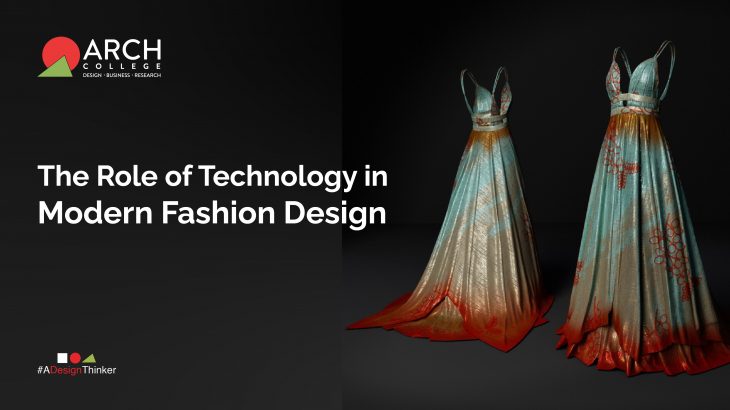Technology is transforming every aspect of the fashion industry, from design and production to marketing and distribution. The fusion of creativity and technology is opening endless possibilities, allowing designers to experiment with innovative materials and tools to bring their visions to life like never before. The adoption of advanced techniques is helping fashion brands enhance efficiency, reduce waste, and create products that cater to the ever-changing demands of consumers.
Let’s explore how technology is shaping a more advanced and responsible fashion world!

Technological Advancement in Fashion Design
Artificial Intelligence (AI) is reshaping the fashion landscape by analysing trends, predicting consumer preferences, and even assisting designers in the creative process. From generating new design ideas to optimizing supply chains, AI is enabling fashion brands to make data-driven decisions that enhance production efficiency and customer experience. Whether it’s trend forecasting or personalized recommendations, AI helps brands stay one step ahead in a competitive market.
The introduction of Smart Fabrics and 3D Printed Clothing is transforming garment production. These innovations offer durability, sustainability, and functionality, making it easier for designers to create clothing that is both stylish and practical. Smart fabrics can adapt to environmental changes, while 3D printing allows for intricate designs with minimal material waste. This combination of technology and fashion empowers brands to craft unique pieces that align with modern sustainability goals.

Sustainability through Technology
Where innovation meets responsibility—technology-driven fashion design is weaving sustainability into every stitch, shaping a future that’s as conscious as it is cutting-edge.
Sustainability is at the forefront of modern fashion, and technology is playing a vital role in achieving environmentally conscious goals. Brands are incorporating biodegradable textiles, organic and recycled cotton, and plant-based fibers into their designs to reduce their environmental impact. Wearable technology, such as temperature-adaptive clothing, further contributes to sustainability by reducing energy consumption and enhancing the longevity of garments. These advancements allow designers to create eco-friendly collections that meet the expectations of conscious consumers.

The Expanding Scope of Fashion Technology
Fashion technology is not just limited to clothing design; it extends to footwear, leather goods, textiles, and jewellery. The integration of technology in these areas has streamlined production processes, improved product quality, and enhanced cost efficiency. Fashion brands can now explore new design possibilities with innovative tools, making the industry more dynamic and responsive to market trends.
Brands like Adidas and Nike use 3D printing to create custom, lightweight shoe soles that enhance performance and comfort. Companies like Digitsole offer smart shoes with embedded sensors that track movement and provide real-time health data. Companies like MycoWorks develop lab-grown leather using mushroom-based materials, reducing environmental impact.

Virtual Fashion and Wearable Technology
The smart revolution in fashion is rapidly growing with the integration of wearable technology. This exciting field merges electronics with clothing and accessories, offering consumers products that combine style with functionality. Virtual Dressing rooms allow shoppers to try on outfits digitally, helping them make informed choices and reducing return rates. These advancements are revolutionizing the shopping experience, making it more interactive and personalized.
Technology has given fashion businesses a deeper understanding of their customers. Through data analytics and AI-powered insights, brands can create personalized shopping experiences, predict demand, and optimize supply chains. This allows them to tailor their offerings to meet customer preferences while maintaining efficiency and sustainability. By embracing technology, fashion businesses can stay competitive and relevant in an ever-evolving market.
Importance of Design Education
As the fashion industry continues to embrace technological advancements, design education plays a crucial role in preparing future designers for success. Programs such as B.Des in Fashion Design, Masters in Fashion Design, and Diploma in Fashion Design are incorporating the latest technological tools to enhance learning and creativity. Students are trained in Apparel Design Software, Fashion Illustration tools, and Virtual Dressing platforms, equipping them with the skills to thrive in the fast-paced industry.

Technologically Advanced Fashion Design Education in Jaipur
Jaipur, renowned for its rich cultural heritage and artisanal craftsmanship, is rapidly becoming a hub for technologically advanced fashion education. The city is blending tradition with innovation, offering students access to cutting-edge design tools such as 3D printing, smart fabrics, and AI-driven design solutions. With a strong focus on sustainability and technological advancement, fashion education in Jaipur equips aspiring designers with the knowledge and skills to make a mark on the global stage while preserving the city’s artistic legacy.

ARCH College of Design & Business plays a pivotal role in facilitating advanced learning by providing cutting-edge tools and techniques in design education. ARCH is also dedicated to promoting sustainable fashion practices by incorporating eco-friendly materials and innovative solutions into its curriculum. The future of fashion lies in the perfect blend of creativity and technology preparing the next generation of designers paving the way for a more innovative and responsible industry.
Join us to explore advanced tools and techniques that enhance the learning experience, enabling them to master the latest trends in fashion design.
